
The chair of Metropolitan Anthony of Sourozh Foundation in Great Britain, Metropolitan Anthony’s spiritual son, our wise, kind, beloved Fr. Peter, fell asleep in the Lord September, 11
Father Peter Scorer, 15th October 1942 – 11th September 2020 by Gillian Crow
It was with very great sadness that we learnt of our beloved Father Peter’s death on 11th September.
Until his ordination to the priesthood on 1st February this year he was simply Peter – or Petya, to his Russian friends – one of the long-standing members of our Deanery and before that of the Diocese of Sourozh, and as his name implies a rock for our Church family.
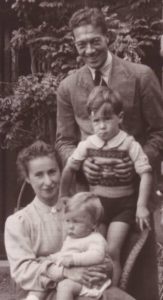 Peter Frank Scorer was born during World War II in Thaxted, Essex at the Priory, where his family were living as evacuees, and was baptised there by Fr Lev Gillet. He took his middle name from the surname of his eminent grandfather, the religious philosopher Symeon Frank.
Peter Frank Scorer was born during World War II in Thaxted, Essex at the Priory, where his family were living as evacuees, and was baptised there by Fr Lev Gillet. He took his middle name from the surname of his eminent grandfather, the religious philosopher Symeon Frank.
The Franks had left Russia in the early 1920s, and after living in Germany and then France, where Peter’s parents were married in the rue Daru Cathedral, they came to England. Sadly, Peter’s English father, Paul Scorer, was killed on active service in August 1943. After the War Peter, his mother Natasha, brother Michael and maternal grandparents Tatiana and Symeon settled in Golders Green, which remained the family home for 60 years until Natasha’s death in 1999. They were members of the Dormition parish in London, and Peter was one of the first group of children there to attend the Orthodox summer camps in France. When a camp was set up in North Wales he, together with Jane Collingridge, Tamara Dragadze, Xenia Bowlby and the Behr brothers formed the nucleus of what was eventually to become a legendary institution.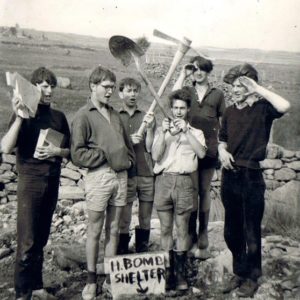
After Arnold House prep school, Peter went as a day boy to Westminster School and then in 1961 to New College Oxford where he read Russian and French. He then studied at St Vladimir’s Seminary, New York, USA from 1964 to 1967 under Fathers Alexander Schmemann and John Meyendorff.
On 1st September 1967 in New York City he married Irina (née Hoecke) – the beginning of a blessed union that was to last for 53 years. The couple returned to England, where they raised their children Thomas and Ksenia, twins born in 1968, and Philip born in 1970, in Exeter, Devon, where Peter took up a lectureship in the Russian Department at the university. He worked there for over 30 years, becoming head of the Russian Department.
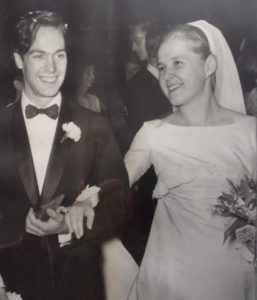 There was a small Orthodox community in Devon; and on 21st October 1973 at the London Cathedral, Metropolitan Anthony ordained Peter deacon to serve the nascent parish of the Holy Prophet Elias with Father John Marks. The parish from the beginning welcomed people of all nationalities and backgrounds and has continued to thrive. Peter was elevated to protodeacon on 13th June 1982, and remained a deacon until this year, when he was ordained priest by Archbishop Nikitas of Thyateira at St Anne’s church in Exeter.
There was a small Orthodox community in Devon; and on 21st October 1973 at the London Cathedral, Metropolitan Anthony ordained Peter deacon to serve the nascent parish of the Holy Prophet Elias with Father John Marks. The parish from the beginning welcomed people of all nationalities and backgrounds and has continued to thrive. Peter was elevated to protodeacon on 13th June 1982, and remained a deacon until this year, when he was ordained priest by Archbishop Nikitas of Thyateira at St Anne’s church in Exeter.
From 1979 up to 2017 Peter took part in running the Sourozh, then Vicariate camps, where his organisational skills coupled with his great sense of humour and kindness made him a firm favourite with the children. He understood the need for Orthodox children scattered across the country to come together and to worship, learn and live as a Church community. Camp was to become a place where lifelong friendships, and not a few marriages, were made.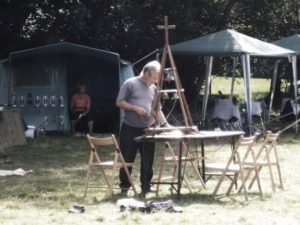
Peter was well-known throughout the Diocese/Deanery. As a deacon he attended Assembly meetings, and he was a key participant in our Annual Conference, where he not only gently guided new deacons in their role, but also compered the party – and sometimes as the evening progressed, led some animated Russian singing. Throughout the vicissitudes of the last few years he remained a stalwart presence, an inspiration and a continuity amid upheaval.
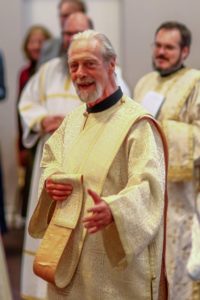 A highlight in Peter’s life was a visit to Uganda in 2012 with Martin Olsson, in connection with the Orthodox Parish there, with which the Devon Parish has been ‘twinned’ for many years. In just a short time Peter endeared himself to the Ugandan people he met, as he did everywhere. The Devon parish continues actively to support the Ugandan parish, in particular arranging sponsorship for some of its young people to attend university.
A highlight in Peter’s life was a visit to Uganda in 2012 with Martin Olsson, in connection with the Orthodox Parish there, with which the Devon Parish has been ‘twinned’ for many years. In just a short time Peter endeared himself to the Ugandan people he met, as he did everywhere. The Devon parish continues actively to support the Ugandan parish, in particular arranging sponsorship for some of its young people to attend university.
In 1991 the St. Gregory’s Foundation was formed, a charity for giving aid to former Soviet Union countries and Peter became an active member – he was for some time its Chairman.
Later he became Chairman of the Metropolitan Anthony of Sourozh Foundation, tasked with preserving the Metropolitan’s archive in Britain and encouraging a wider audience for his vision. Peter attended almost annually for some 15 years (until 2019) the Metropolitan Anthony Conferences in Moscow and London .
In 1988 with Father John Marks he led the Diocese of Sourozh’ pilgrimage to the Russian Church (he had been on a similar pilgrimage in 1960, then led by Deacon Sergei Hackel). Whether the churches visited were in use or just shells, Peter boldly led the singing of hymns and prayers, sometimes to the amazement of the babushkas in charge. He also sang before meals in the hotels – the other guests were astonished. In the southern city of Rostov-on-Don at a banquet following the Liturgy, Peter was asked to speak. He memorably said, regarding the Church’s position at that time, ‘Strike while the iron is Gorbachov’ (a pun on the Russian word for ‘hot’). This was typical of his willingness to speak out, in a charming and amusing way, where others may have been hesitant.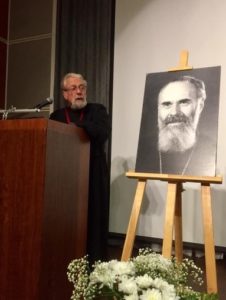
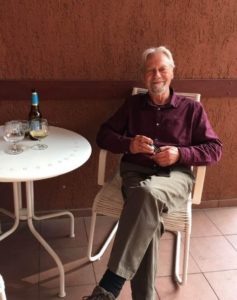
Since 1988 he visited Russia many times. Notably in 1989 he and Irina accompanied Metropolitan Anthony as clergy and lay persons to a Sobor in Moscow.
He also had many friends, such as the Struve family, in France and other places. Wherever he had been, he left a ray of light. His big personality, and the twinkle in his eyes, were not easily forgotten.
Latterly Father Peter had been helping with information on his grandfather Symeon Frank, whose works are now attracting great attention in Russia; a series of his complete works is currently being prepared.
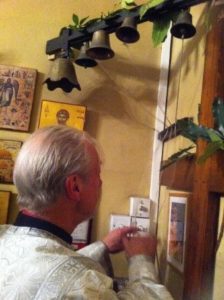
But there was something else that Father Peter did during his last months. Following his ordination to the priesthood and the country’s subsequent lockdown and closure of churches, Father Peter, together with Irina as his choir, began streaming online services: Vespers on Wednesday and Saturday evenings, and the Liturgy on Sunday mornings, including all of the Holy Week, Easter and Pentecost services. He celebrated the Liturgy for the last time on July 26th, on day of his twins’ birthday. 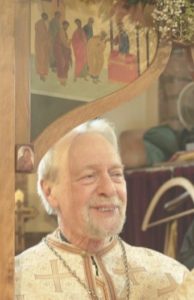
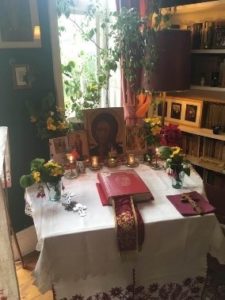 These services involved not only celebrating but sorting the technology and, for a man whose lungs were not in a good state, much singing – he joined Irina in the ‘choir’ when he could. Father Peter valiantly continued giving a spiritual lifeline to so many people who were otherwise deprived of any church life, until his health gave out. He spent his last days surrounded and cared for by family in the dining room where family and friends had gathered many times over the course of 20 years to eat together and celebrate numerous birthdays and feasts .
These services involved not only celebrating but sorting the technology and, for a man whose lungs were not in a good state, much singing – he joined Irina in the ‘choir’ when he could. Father Peter valiantly continued giving a spiritual lifeline to so many people who were otherwise deprived of any church life, until his health gave out. He spent his last days surrounded and cared for by family in the dining room where family and friends had gathered many times over the course of 20 years to eat together and celebrate numerous birthdays and feasts . 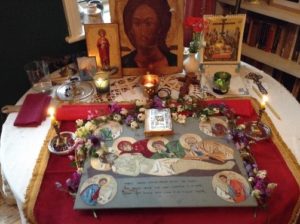
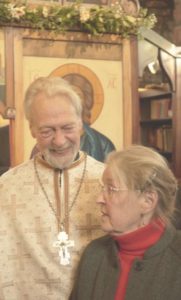
As a deacon for nearly 50 years, Peter’s vocation was one of service – to the church, to his parishioners, to his students, to his family, to all his friends. He continued this into his short but crowning priesthood. But he served us all with a wonderful sense of humour, with humanity, with kindness and a certain mischief; he was never ‘pious’. Dignified in church, he was warm and funny in the world. He was much liked and much loved. A brief outline of his life cannot convey Father Peter’s warmth, nor the warmth we all felt for him.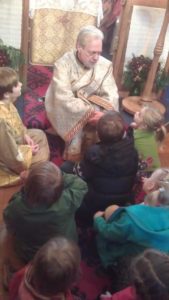
He was truly an inspiration and will remain close to us all in our hearts.
Eternal Remembrance, dear Father Peter!
Father Peter Scorer by Elizabeth Theokritoff
15 October 1942 – 11 September 2020*
Fr Peter Scorer exemplified in many ways the world and culture of the Russian emigration, out of which the Fellowship of St Alban and St Sergius also was born. He was a senior figure in
what is now the Deanery for parishes of Russian tradition in the Archdiocese of Thyateira, and one of a dwindling number of clergy ordained (deacon, in his case) by Metropolitan Anthony and formed by his vision of the Church. A lecturer in Russian and a dedicated churchman, Peter was someone who built bridges, spanned cultures and brought people together. He had a gift for creating community and enlivening any gathering. He was wonderful company, with an irrepressible wit that overlay wise and mature judgement; an endless source of stories both entertaining and illuminating, a warm and gracious host and an open-hearted friend.
Peter was born in London to a Russian mother and an English father, who worked at Bletchley and was killed when Peter was a few months old. His mother’s family were refugees twice over, first from the nascent USSR on the famous ‘philosophers’ ship’ and then from Nazi Germany. His maternal grandfather was the religious philosopher Semyon Frank. Peter would firmly disclaim any expertise in his grandfather’s demanding philosophical thought, but he worked closely with international scholars as well as members of the extended family dedicated to the study and dissemination of Frank’s thinking and preservation of his memory. The celebration of family history across national boundaries was not always without its complications. On one trip to Russia, he had brought with him a photo album compiled by his grandmother to show to an elderly aunt in Saratov, and was duly taking it home again when his luggage was searched at the airport. Recognising the item as a historic treasure of Russian culture, the customs officials were persuaded only with difficulty that its rightful home was in Exeter.
The London church community in which Peter grew up was small and markedly Russian, but with cordial ties with the Church of England, not least through the FSASS. Baptised by Fr Lev Gillet, who would serve for much of his life as Fellowship chaplain, Peter and his brother were taken as children to the Fellowship summer conferences in the days when those events doubled as family holidays, at which Orthodox and Anglican families got to know each other and some life-long friendships were formed. Unusually for the time, he had an opportunity in his late teens to visit Russia in a Diocesan group with Nicolas Zernov and Serge Hackel, when they were shown some officially-sanctioned vignettes of church life against the unmentioned backdrop of Krushchev’s persecutions – an experience he found profoundly disturbing.
After reading Russian at Oxford, Peter pursued studies in theology at St Vladimir’s Seminary in New York. This was a period (mid-1960s) when the Seminary was adorned with some of the great names of twentieth century Orthodox theology who had been formed by the Russian emigration in Paris, most notably Fr Alexander Schmemann and Fr John Meyendorff. Schmemann’s vision of the Church and its liturgical life, and above all his spirit of joy, would leave an indelible impression. The seminary years expanded Peter’s experience of the Church and network of contacts: his fellow students included two future bishops, as well as eminent churchmen such as Fr Leonid Kishkovsky, who would go on to serve as Secretary for External Affairs in the Orthodox Church in America and a central committee member of the WCC. Fr Leonid and Peter remained close friends and were frequently in touch, exchanging news and perspectives on church life and events. It was also while in New York that Peter met and married Irina Hoecke, likewise the child of a much-travelled Russian emigre family distinguished for its contribution to church life.
In 1968, Peter took up a position in the Russian department of Exeter University. There was already a small English-speaking Orthodox community of the Prophet Elias near Exeter, soon to be augmented by a group worshipping in a house church on the North Devon coast. It was for this community that Peter was ordained deacon in 1973, to assist and support John Marks, who would be ordained priest the following year. Thus began a pattern that would continue into the 1980s (when many services started being celebrated in Exeter): every weekend and many feast days, the entire family plus dog would pile into the car for the 50 mile journey to Combe Martin, stay over in sleeping bags, participate in the services and gather with the community round the Markses’ apparently infinitely expandable dining table. It was emblematic of Peter’s monumental dedication in the service of the Church, as well as the zest and joy that he brought to everything he undertook.
The large geographical spread of the parish, with the priest at one end and the bulk of the parishioners at the other (nearer Exeter), meant that Peter’s role in the community was indispensable: he really was like his namesake a rock, a figure of stability and continuity. The knowledge and experience garnered from study in an Orthodox theological school were a rare and precious commodity in the Diocese of Sourozh, but his personal qualities were of even greater importance. Outgoing and engaging, a man of deep culture both English and Russian and equally at home in both, he played a very important part in drawing and welcoming to the parish a variety of people from widely assorted backgrounds. As well as English converts, they included miscellaneous Russians who found themselves in Exeter before the fall of communism, and of course many more Eastern Europeans later on. At a time when many of the small Anglophone Orthodox parishes were wrestling, often rather self-consciously, with what it means to be both Orthodox and British, Peter and his family were a model for a community where the riches of various Orthodox cultures are celebrated and shared, while the local culture is equally embraced, including local saints and places of pilgrimage.
Peter served more than 46 years as a deacon, with every expectation that this ministry would be life-long. It was a whole-hearted vocation: diakonia was in his bones. Not that he fitted his own typically irreverent description of the archetypal Russian deacon, ‘the familiar figure bellowing out litanies like some parade ground drill sergeant’. He could also perform the more decorative functions of deaconing when required: he had a fine voice and would serve with Metropolitan Anthony at major services, including for many now classic recordings. But above all, he embodied his Bishop’s vision of the deacon as one who is constantly moving between the nave and the sanctuary, the world and the Kingdom of God. According to Metropolitan Anthony’s sermon at Peter’s ordination, the task of the deacon is ‘to express the compassionate love of the Church’; deacons were instituted as the Church’s ‘instrument of love amongst those who were poor, who had been touched by misfortune, cast down by grief’. As Peter himself would put it, ‘in a mysterious way the deacon represents a eucharistic concept of charity’. The needs of a widely-scattered parish meant that Peter took on much more of the ancient, pastoral diaconal work than is usual for an Orthodox deacon today, visiting the housebound and prisoners and taking Communion to the sick, as well as on occasion preaching. In many unobtrusive ways, his was a life of serving Christ in those around him – but with such apparent ease and grace that one could readily fail to see it as ‘service’. One could say that ‘serving at tables’ was precisely his vocation, alike in the church and outside it. There was no discontinuity: he moved effortlessly from liturgical duties to cooking lunch for a dozen or two parishioners, visitors and family members, where the cheerful and informal conviviality conveyed in the most concrete and human terms the festive joy of fellowship, the communion of love. Peter and his family had a key role in creating the sort of ‘village’ that it takes to raise a child in the Church. It is hardly coincidental that, in these days when social pressures often encourage lapsing into agnosticism, the parish of Prophet Elias has an enviable record of nurturing young people who retain their faith and connection with the Church.
The holistic approach to Christian formation and transmission of faith was exemplified on a larger scale in the Diocesan Children’s Camp. This initiative was begun by Metropolitan Anthony not long after he came to England; Peter was one of the early campers, and went on to become one of the mainstays of the Camp for decades, greatly loved by generations of children. As with so much of what Peter did, this was a family endeavour. Every summer, he and Irina would load up the car with children, large dog and miscellaneous impedimenta and head off to spend three weeks under canvas, contributing immeasurably to an experience of Christian community that would shape many young lives. It was also largely on Peter’s initiative that something of this experience of Church as community, albeit in less primitive living conditions. was made available also to adults. In conversation with some other Orthodox clergy at a Fellowship conference in the early 1970s, he was musing on the irony that this ecumenical setting was also the only forum for Orthodox to meet each other, even those within the same diocese. Thus was planted the seed that would grow into the Sourozh diocesan conference, initiated in 1975.
Making connections with and between people was one of Peter’s great gifts, and the opening-up of the USSR in 1980s followed by the fall of communism gave opportunities to greatly increased contacts with Russia, in the Church but also beyond. With colleagues in the Russian Department of Exeter University, Peter was involved in setting up student exchanges with the University of Yaroslavl, which soon led to the twinning of the two cities: Peter and Irina were founder members of the Exeter-Yaroslavl Twinning Association in 1990. These links provided additional excuses for trips to Russia, and from then on, Peter and Irina would visit most years. An early highlight was their attendance at the 1989 Church Council, accompanying Metropolitan Anthony as representatives of the diocese. This was an unforgettable experience of a pivotal moment in Russian church history, including the first service since the 1920s in the Dormition Cathedral in the Kremlin. It was no less moving to see at first hand the love and esteem in which the Metropolitan was held, and the crowds that packed into halls or private flats to hear him speak and answer questions.
Much of Peter’s energy in retirement went into work with the Metropolitan Anthony of Sourozh Spiritual Heritage Foundation (Russia) and Metropolitan Anthony of Sourozh Foundation (UK), established after the Bishop’s death to collect and preserve his work and make known his legacy. Peter was a tireless, versatile and enthusiastic contributor to almost all the Foundation’s conferences in Moscow: a witty and animated speaker, an engaging workshop leader and a skilled and gracious moderator. His openness made a deep impression, as did his readiness to give honest answers to the most difficult and challenging questions. Not only could he speak with authority about a man he had known all his life; Metropolitan Anthony’s protodeacon was also seen as a living link to a tradition of Orthodoxy which people in Russia felt they had lost during the Soviet period.
In the British organisation, too, Peter’s contribution as a ‘living link’ was important. He was well placed to preserve Metropolitan Anthony’s memory from nostalgia on the one side and hagiographic piety on the other. The Bishop he had known, and been profoundly influenced by, was a man who had a burning love for Christ, abhorred pomp and pomposity and had little patience with clericalism or ‘churchianity’. And who was in his element playing volleyball with a gaggle of rather muddy children at Camp. Again, Peter was an irreplaceable presence at conferences and other events, and served the Foundation as Chairman for several years.
In the sad fragmentation of the Diocese that followed Metropolitan Anthony’s death, Peter was one of those who managed to maintain communication and indeed friendships across the new dividing lines. He also took on an increasingly important role in the Deanery of parishes that had joined Constantinople. With a lifetime of experience in the Diocese and a wide network of contacts among the Orthodox of Western Europe as well as Russia, he was someone uniquely able to offer vision and direction. So it felt almost a natural development that in February 2020, the apparently life-long deacon was ordained priest.
Fr Peter’s priestly ministry was remarkable in more ways than one. After much of a lifetime spent standing by the Holy Table as deacon, his reverent joy in offering the Eucharist was palpable. Those who had been concerned that his characteristic light-heartedness might not sit well with the dignity of the priesthood need not have worried. He served in Exeter and Combe Martin for some seven weeks before lock-down was imposed and churches closed. Already in his late seventies, he was in a high-risk group and ‘forbidden to leave the house’. But he continued celebrating services, with Irina as reader and choir. All the living liturgical theology that he had absorbed from Metropolitan Anthony and Fr Alexander Schmemann shone through these services. With the antimension on a small table in a re-purposed dining room, the Divine Liturgy was revealed in its awesome majesty, unencumbered by any spurious human grandeur. As with many parishes streaming their services, the Exeter services attracted participants from well beyond the parish, and indeed the country. For a number of those watching, the room would have been immediately familiar, bringing back memories of good company and good cheer lasting till dusk on Sunday afternoons. Perhaps this caused some momentary distraction; but it may also have inspired reflection on ‘liturgy after the Liturgy’, and the many different ways in which ‘eucharistic charity’ touches people’s lives.
The streamed Liturgies continued, latterly from the church (a beautiful but tiny almshouse chapel quite unsuited to social distancing) until Fr Peter was suddenly taken ill in July, and soon became unable to serve. When he was discharged from hospital with a diagnosis of terminal cancer and a few days left to live, it was peculiarly fitting that he returned to that same room, where he had so often served at tables both human and divine, to make his final offering. The symmetry brings to mind the words of St Ignatius, who awaited the pangs of dying as the grinding of God’s wheat into the bread of Christ.
Peter faced death with courage and serenity. To the end, he delighted in human company and fellowship, and passed on the gift of seeing God’s presence within it. Confined to his bed, he took pleasure alike in visits and in the voices drifting in from the garden, as family and friends chatted and laughed together in between seeing him. As he said to old friends a few days before he died, ‘It is divine love’.
Eternal memory! Вечная память!
* In composing this obituary, I am grateful for insights and information from Matushka Irina Scorer, Veronica Davies, Irina Kirillova, Celia Olsson, Avril Pyman and Elena Sadovnikova.
Publ. Sobornost/ECR 42:1-2 (2020), 201-8

